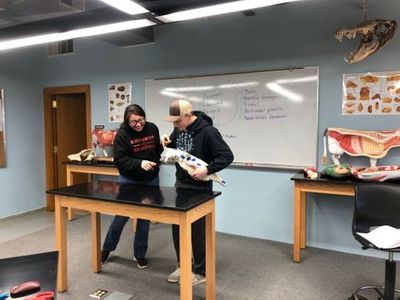Agriculture Program
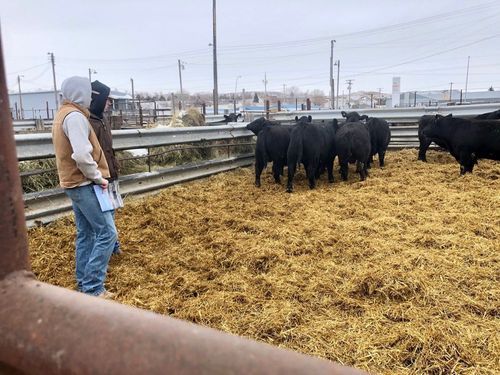
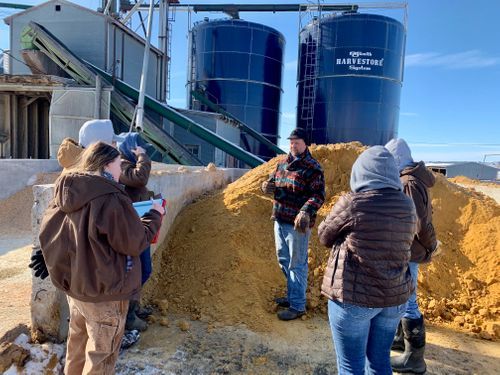
The Agriculture and Animal Science curriculum at Dawson Community College will give students a solid foundation in scientific principles, emphasizing agriculture sustainability practices. The program is designed to provide hands-on technical skills to prepare students for careers in the industry.
Educational Expeditions
- Triple T Specialty Meats
- Glendive Livestock Exchange
- Glendive Veterinary Clinic
- Stortz Angus Ranch
- Lassle Ranch Simmentals
- Homestead Cattle Company
- Gibbs-Stortz Bull Sale
- Ag Pro Solutions
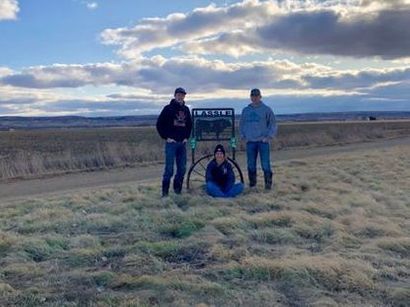
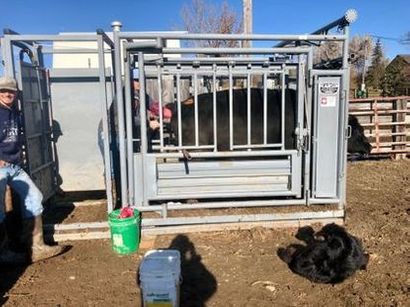
Technical Projects
- Design and Construct Livestock Handling Facility
- Beef Project
- Pork Project
- Develop Operation and Business Marketing Plans
- Animal Behavior Research
- Beef Cattle Breed Research
- Feeding Program Development
- Genetic Selection for Herd Improvement
Program Extras
- Beef Quality Assurance Certification
- Guest Speakers from Industry Leaders
-
Internships
A maximum of 10 total credits may be earned for work experience with approved agencies. AGSC 298 is a sophomore level internship. An internship experience provides the student with an opportunity to explore career interests while applying knowledge and skills learning in the classroom in an applicable work setting. The experience also helps students gain a clearer sense of what they still need to learn and provides an opportunity to build professional networks. In general, 45 hours of work experience, including the final seminar, is equivalent to one credit. The work experience is directed by the college and the student’s work is controlled by the supervising instructor and the internship employer.
DCC Alum April Davis' Internship with Beach Veterinary Clinic
Clubs
Collegiate Young Farmers & Ranchers (Supported by the Montana Farm Bureau Federation)
Potential Careers
-
Upon Completion of an Ag Program at DCC
Graduates from our program that would like to go straight into the industry have a variety of careers to choose from including technical positions in the industry, veterinary assistants, ranch management, agriculture sales, and many other opportunities.
-
Upon Completion of B.S. in Animal Science
Program graduates that continue their education have a wide variety of career options to choose from including ranch management, agricultural extension service, livestock procurement, federal meat grading, federal and state livestock and meat inspection, and market news reporting. There are also careers in business-related areas of livestock production including animal health sales, livestock feed sales, farm loan representatives, and banking. Excellent opportunities are available for those with special training in agricultural communication such as working on farm magazines and journals, breed association field representatives with livestock associations, and public relations.
-
Upon Completion of an Advanced Degree
For students desiring to pursue an advanced degree, this program prepares individuals for graduate studies in animal science, agriculture economics, food science, or other related disciplines. This program will also serve students who are desiring to pursue their degree in veterinary medicine.
Course in Agriculture Program
-
AGBE 105 - Ag Marketing
This course covers principles of economics and agricultural marketing functions, agencies, services, and economic problems associated with production agriculture in Montana. The course includes an overview of commodity trading and the futures market.
-
AGBE 210 - Economics of Ag Business
Topics include the theory of demand, product supply, and performance of the economy as a whole. Various economic policies are considered. Basics of marketing are studied. Marketing strategies and problems associated with agriculture commodities are also studied.
-
AGBE 278 - Agribusiness Planning
A capstone course encompassing all of the skill sets taught in the Ag curriculum.
-
AGSC 260 - Ag Fundamentals
This seminar course is designed to cover knowledge in the following topics: Ag business plan development, operation transfer management, markets and economics, budgeting and finance, farm and ranch management, Ag technology, livestock production, crop and forage production, Ag career building, and issues impacting the Ag industry. We will be bringing in industry experts when applicable to help cover topics. We will be making an effort to focus on an economic component to topics when applicable.
-
AGSC 294 - Ag Workshop/Seminar
Concentrated class sessions on a topic for which a particular need has been identified.
-
ANSC 100 - Intro to Animal Science
This course is an introductory animal science course, which includes basic principles of animal genetics, nutrition, live animal evaluation, reproduction, and application to the production of beef and dairy cattle, sheep, swine, horses, and poultry.
-
ANSC 108 - Livestock Evaluation
This course will expose the students to livestock evaluation. Through lecture and correlating lab (ANSC
109). The students will work with live animals and learn the terms used to evaluate livestock and apply this to selection of genetics. -
ANSC 109 - Livestock Evaluation Lab
See ANSC108.
-
ANSC 202 - Livestock Feeding and Nutrition
This course deals with metabolism of nutrients; nutrient requirements; feed composition; diet formulation; and practical feeding of various classes of animals, nutrient content of feeds, their digestion, and absorption. Emphasis on developing balanced rations using various feeds. Rations are balanced using feeds that are common to or readily available to Montana. Special attention is given to range land environments and seasonal changes.
-
ANSC 215 - Calving Management
This course will aid in understanding the nutritional needs of cows and heifers during gestation and after parturition. Students are prepared to recognize calving problems and subsequently assist during parturition, all to maximize calf survival. Additional fee required.
-
ANSC 222 - Livestock in Sustainable Systems
This course is a systems approach to sustainable livestock and agricultural production systems. The student will be exposed to multiple aspects of livestock operations and agricultural production systems and how they affect one another and maintain sustainability. The student will also be exposed to proper handling facilities and design of them to reinforce the efficiency of operational sustainability.
-
ANSC 234 - Livestock Management Beef I
This course will cover proper beef cattle handling, reasons for proper handling, knowledge of basic beef cattle management skills, and Montana Beef Quality Assurance Certification.
-
ANSC 240 - Animal Reproduction
Principles of reproductive physiology associated endocrine hormones, their function, and application to domestic animals such as cattle, sheep, goats, horses, and pigs. Basis for reproductive management providing knowledge in environmental influences on reproductive efficiency and application of selected techniques for controlling reproduction. Additional fee required.
-
ANSC 262 - Range Livestock Production
The course teaches principles of beef and sheep production in range land environments. Breeding, reproduction, nutrition, marketing, and distribution are examined.
-
ANSC 265 - A & P of Domestic Animals
The course defines and identifies the organization of cell types into tissues and organ systems. The course explains the physiology of organ systems in domestic farm animals.
-
ANSC 266 - A & P of Domestic Animals Lab
Location, structure and identification of various tissues, organs, and systems of domestic animals through dissection of cadaver animals. Lab utilizes ruminants of mono-gastric species. Additional fee required.
-
ANSC 299 - Capstone
This capstone course is intended to showcase the student's interdisciplinary knowledge of the Agriculture Program Learning Objectives. Students pursue research on a question or problem of their choice, engage in scholarly debates in the relevant disciplines, and, with the guidance of a mentor, produce a substantial paper that reflects a deep understanding of the topic.
-
EQUH 110 - Western Equitation
This course involves gentling and starting a green horse, 2-3 years of age, halter breaking, leading at walk, trotting and backing, handling of feet and legs, feeding, reproduction, and selection practices. Students must have a horse and consent of the instructor. Additional fee required.
-
EQUH 210 - Intermediate Western Equitation
A continuation of EQUH110. Starting the horse on a bit (snaffle or hackamore), driving, backing, lunging and ground work, advanced horse management practices, anatomy, physiology and training practices. Students must have a horse. Additional fee required.
-
EQUH 253 - Starting Colts
This is a class designed for both horse and rider. The rider must be significantly advanced to maintain a secure seat at a lope. There will be special emphasis on cueing the horse with hands, legs, weight, and voice. The student must have a horse. Additional fee required.
-
EQUH 256 - Developing the Young Horse
This is a class designed for experienced students and horses. There will be special emphasis on advanced reining, collection, headset lead changes, side passes, pivots, and roll backs. The student must have a horse. Additional fee required.
-
EQUS 150 - Equine Production
A major objective of this course is the development of an understanding of the production and management techniques necessary for the successful operation of the horse enterprise. Management practices concerned with feeding, breeding, and health programs receive considerable attention. Age determination, breeding, health care, unsoundness, way of going, nutrient needs, parasite control, buildings, and equipment are among the many areas covered. Students will cover material related to preventative equine medicine and methods associated with such care.
-
EQUS 233 - Horse Science and Management Lab
This course is designed for students who currently work with horses or desire to be involved with horses in the future and will provide important horse safety information.
-
NRSM 101 - Natural Resource Conservation
This course is an overview of soils, water, rangelands and wildlife conservation from the global to the local level. Impacts of human population growth, economics, ethics and agriculture on the sustainability of natural resources will be examined using basic principles of ecology. The application of ecological principles to agriculture and rangeland management will be included.
-
NRSM 102 - Montana Range Plants
The laboratory exercises are designed to relate to the concepts from NRSM101 to rangeland management. Rangeland inventory and classification methods will be reviewed. Sixty common native and introduced plants will be identified in the field and in the classroom.
Degree and Certificate Options
-
Associate of Science: Concentration in Animal Science
-
Associate of Applied Science - Animal Science: Livestock Production Management
The two-year Associate of Applied Science in Animal Science trains students for employment in traditional, broad-based animal agriculture, such as livestock production, business, and services related to livestock. Additional professional opportunities include ranching, extension, livestock consulting, market livestock analysis, meat grading, and animal recreation.
Program Outcomes
- Build a strong knowledge base regarding the role of livestock in agriculture, including basic concepts and principles of animal nutrition, growth, health, behavior, reproduction, and genetics.
- Provide an introduction to commercial applications, including ration formulation, disease, prevention, AI, genetic selection and crossbreeding systems, and agriculture business and technology.
- Give the student the opportunity to demonstrate knowledge, skills, attitudes, and practical experiences for entry-level employment or self-employment in the agricultural industry segments.
- Serve those students seeking a career in Agriculture and/or planning to pursue an education beyond the associate’s level.
- Expose students to courses in computation, communications, and human relations, and will assist students in developing an understanding and appreciation for diversity, social responsibility and the participation in public affairs.
- Provide students with opportunities for practical experience in the Agriculture system via internships, fieldwork, and skills-based course offerings.
- Assist students in the development of critical thinking and problem-solving skills, and the ability to conceptualize ideas.
-
Associate of Applied Science - Animal Science: Equitation
The equitation option is provided for students who have an interest in working in general agriculture and first and foremost the horse industry. The equine industry is growing and ever changing. The A.A.S. degree is intended to provide basic, practical, and theoretical grounds from which they can choose a field in the industry. Students work with young horses to acquire knowledge and skills in horsemanship, training, safe horse handling, and husbandry. Furthermore, a background in general agriculture is added to make for a very well rounded individual in knowledge that is important in livestock, feeds, range condition, business and marketing. The program is also designed for students who plan to pursue an advanced university degree in the field.
Program Outcomes
- Students will build a strong knowledge base in the field of Ag/Equine Science and practical skilled-based exposure in its related industries (Animal Sciences, Equine Sciences, Range and Soil Sciences, Business and Marketing).
- Give the student the opportunity to demonstrate knowledge, skills, attitudes, and practical experiences for entry- level employment or self-employment in the equine and agricultural industry segments.
- Expose students to courses in computation, communications, and human relations, and assist students in developing an understanding and appreciation for diversity, social responsibility and the participation in public affairs.
- Provide students with opportunities for practical experience in the Agriculture/Equine Industry via internships, fieldwork, and skills-based course offerings.
- Assist students in the development of critical thinking and problem-solving skills, and the ability to conceptualize ideas.
- Serve those students seeking a career as an Equine Professional by providing in-depth and practical skills-based exposure to the equine training and sciences component of Agriculture.
-
Certificate of Applied Science - Livestock Technology
The one-year Certificate of Applied Science in Livestock Technology is designed for the person who plans to return to the farm or ranch to pursue a career working in the livestock production industry. The curriculum stresses production techniques that can be applied immediately to the livestock enterprise. Basic academic courses are included to provide a well-rounded education.
Program Outcomes
- Build a strong base of knowledge in the field of Agriculture
- Prepare students for entry level employment in public and private Agriculture-related organizations.
- Assist students in the development of critical thinking and problem-solving skills, and the ability to conceptualize ideas.
- Expose students to courses in computation, communication, and human relations, and will assist students in developing an understanding and appreciation for diversity, social responsibility and the participation in public affairs.
- Serve those students seeking a career in Agriculture by providing in-depth and practical skills-based exposure to general Agriculture.
-
Certificate of Applied Science - Ag Business Management
This program is designed for the student who plans to return to the farm or ranch or to pursue a career working in the agriculture industry from a business management perspective. The curriculum stresses agriculture business skills that can be applied immediately to any agriculture operation. The curriculum also exposes the person to a broad overview of livestock, as well as, their sustainable production systems. Basic academic courses are included to provide a well- rounded education.
Program Outcomes
- A student will have built a strong foundation in the agriculture industry from a business management perspective and will be able to effectively contribute to an agriculture operation.
- A student will be prepared for entry level employment in public and private agricultural business-related organizations.
- A student will be able to think critically and effectively utilize gained problem-solving skills.
- A student will have been exposed to courses in computation, communications, and human relations, which will assist students in developing an understanding and appreciation for diversity, social responsibility and the participation in public affairs.
More Information

